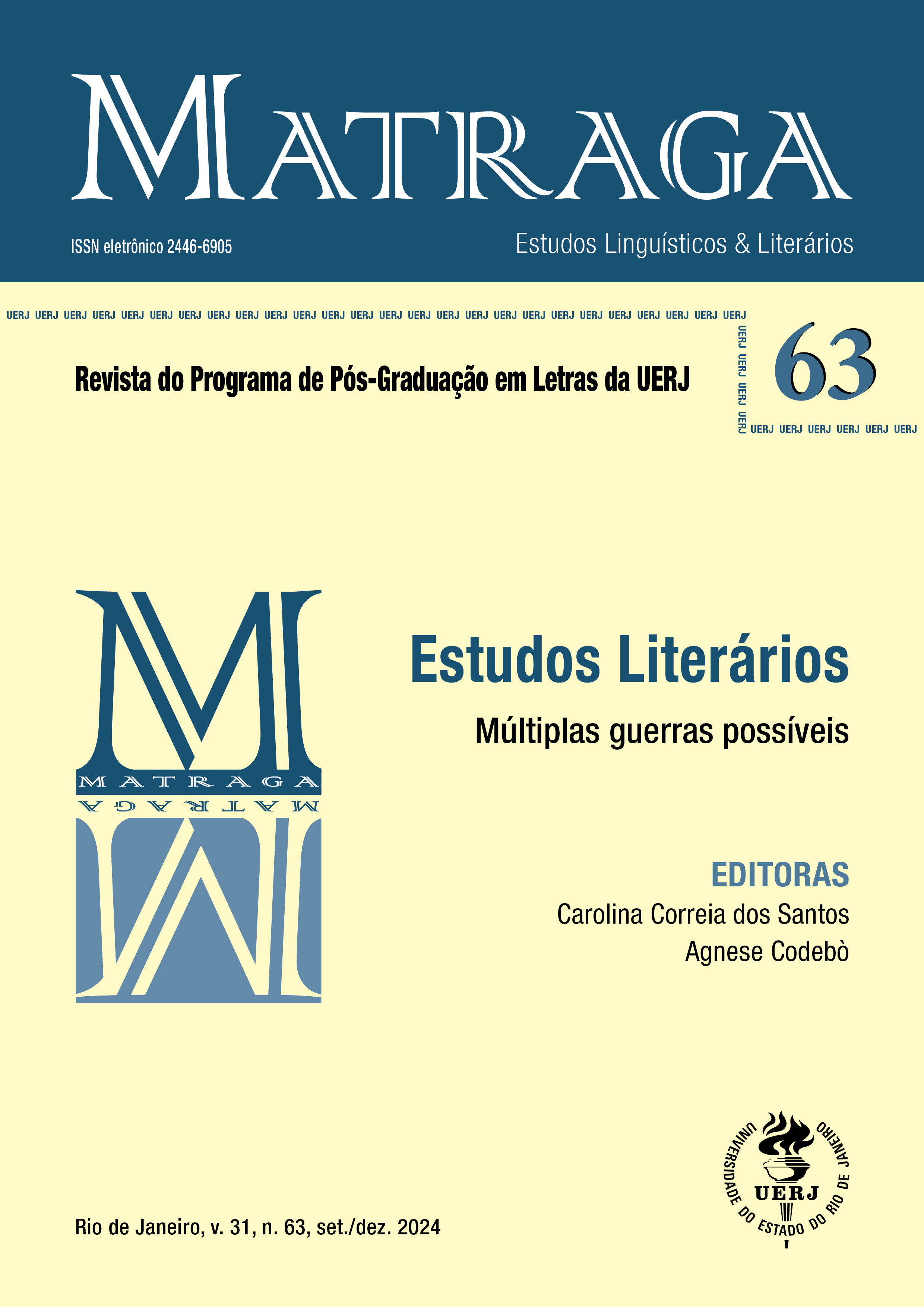The Impropriety of Pirates
DOI:
https://doi.org/10.12957/matraga.2024.85316Keywords:
Pirates, Machado de Assis, Borges, MoguillanskyAbstract
There are few pirates in the Latin American cultural tradition even though piracy was a fundamental force shaping the trajectory of the colonial and post-colonial Americas. This essay traces the seeming impropriety of piracy in relation to a genealogy in which pirates are themselves figure of the improper, conduits for improper wars and markers of struggles over the proper relationship to property. Readings of a few key texts – Machado de Assis’ “Canção de Piratas” (1894), J. L. Borges’ “La viuda Ching, pirata” (1935), Alejo Moguillansky’s film El escarabajo de oro (2014), and Nuruddin Farrah’s Crossbones (2011) – take the textualizations of piracy as reflections on the carrying capacity of form.
Downloads
References
ASSIS, Machado de. Canção de Piratas. Disponível em:<http://biblio.com.br › cancaodepiratas>. Acesso em: 22 junho, 24.
CALASANS, José. Cartografia de Canudos. Salvador, Brazil: Secretaria da Cultura e Turismo do Estado da Bahia, Empresa Gráfica da Bahia, 1997.
CURTIS, Isaac. Masterless People: Maroons, Pirates and Commoners. The Caribbean: A History of the Re¬gion and Its Peoples. 2011.
DAWDY, Shannon Lee. Why Pirates are Back. Annual Review of Law and Society. Sci. 2011. 7, p. 361–85.
FARRAH, Nuruddin. Crossbones. Riverhead Books, 2011.
GERASSI-NAVARRO, Nina. Pirate Novels: Fictions of Nation Building in Spanish America. Duke University Press, 1999.
LARKIN, Brian, Signal and Noise: Media, Infrastructure and Urban Culture in Nigeria. Duke University Press, 2008.
LINEBAUGH, Peter and Marcus REDDIKER. The Many-Headed Hydra: Sailors, Slaves, Commoners and Hidden History of the Revolutionary Atlantic. Beacon Press, 2013.
LOMAN, Andrew. The Sea Cook’s Wife: Evocations of Slavery in Treasure Island. Children’s Literature. Vo¬lume 38, 2010.
LOPEZ NADAL, Gonçal. Corsairing as Commercial System: The Edges of Legitimate Trade. Bandits at Sea: A Pirate Reader. C.R. Pennell, Editor, New York University Press, 2001, p. 125-138.
PAYNE, Thymaya. Stolen Seas. 2013.
MOGUILLANSKY, Alejo. El escarabajo de oro/The Gold Bug. Pampero Cine. 2014.
MOGUILLANSKY, Alejo; Joshua, Botain. A Search for Freedom:A Conversation with Alejo Moguillansky. Notebook Interview (Nov 2021). Disponível em: <https://mubi.com/en/notebook/posts/a-search-for-free¬dom-a-conversation-with-alejo-moguillansky>. Acesso em: 22 junho 2024.
MURRAY, Dian. Cheng I Sao in Fact and Fiction. Bandits at Sea: A Pirate Reader. C.R. Pennell, Editor, New York University Press, 2001, p. 253-282.
POLICANTE, Amedeo. Hostis Humani Generis: Pirates and Empires from Antiquity until Today. Disserta¬tion submitted for PhD in Politics at Goldsmiths College, 2012.
POLICANTE, Amedeo. The new pirate wars: the world market as imperial formation. Global Discourse: An Interdisciplinary Journal of Current Affairs and Applied Contemporary Thought. 3:1, 2013, p. 52-71.
POLICANTE, Amedeo. The Pirate Myth: Genealogies of an Imperial Concept. Routledge, 2015.
POLICANTE, Amedeo. The Return of the Pirate: Post-colonial Trajectories in the History of International Law. Politica Comun. Volume 5, 2014. Disponível em: <https://doi.org/10.3998/pc.12322227.0005.005>. Acesso em: 22 junho, 24.
POIER, Salvatore. Hostis humani generis. History of a multifacted word. darkmatter Journal, 2009, Issue-5, Pirates & Piracy, p. 39-52.
REDDIKER, Marcus. Villains of All Nations: Pirates in the Golden Age. Beacon Press, 2005.
SAID, Edward. Orientalism. Vintage Books: New York, 1979.
SCHMITT, Carl. Writings on War. New York: Polity, 2011.
STEVENSON, Robert Louis. Treasure Island. Disponível em: <https://www.gutenberg.org/files/120/120-h/ 120-h.htm>. Acesso em: 22 junho 2024.
SUNDARAM, Ravi. Externalities, Urbanism and Pirate Modernities: India. Rising Powers Working Paper, ESRC Rising Powers Programme. Goldsmiths, University of London, July 2010.
WALSH, David. Entrevista con Alejo Moguillansky, codirector de El escarabajo de oro. 2015. Disponível em: https://www.wsws.org/es/articles/2015/04/09/ficu-a09.html. Acesso em: 22 junho 2024.
Downloads
Published
How to Cite
Issue
Section
License

This work is licensed under a Creative Commons Attribution-NonCommercial 4.0 International License.
Authorization
Matraga – Scientific Journal of the Post-graduate Program in Arts and Humanities of UERJ is authorized to publish the article submitted here, if it is accepted for online publication. It is attested that the contribution is original, that it is not being submitted to another publisher for publication, and that this statement is the expression of truth.
The works published in Matraga's virtual space – Scientific Journal of the Post-graduate Program in Arts and Humanities of UERJ will be automatically transferred, and your copyright is reserved to Matraga. Its reproduction, in whole or in part, is conditional on the citation of the authors and the data of the publication.

Matraga uses license Creative Commons - Attribution-Non-Commercial 4.0 International.





